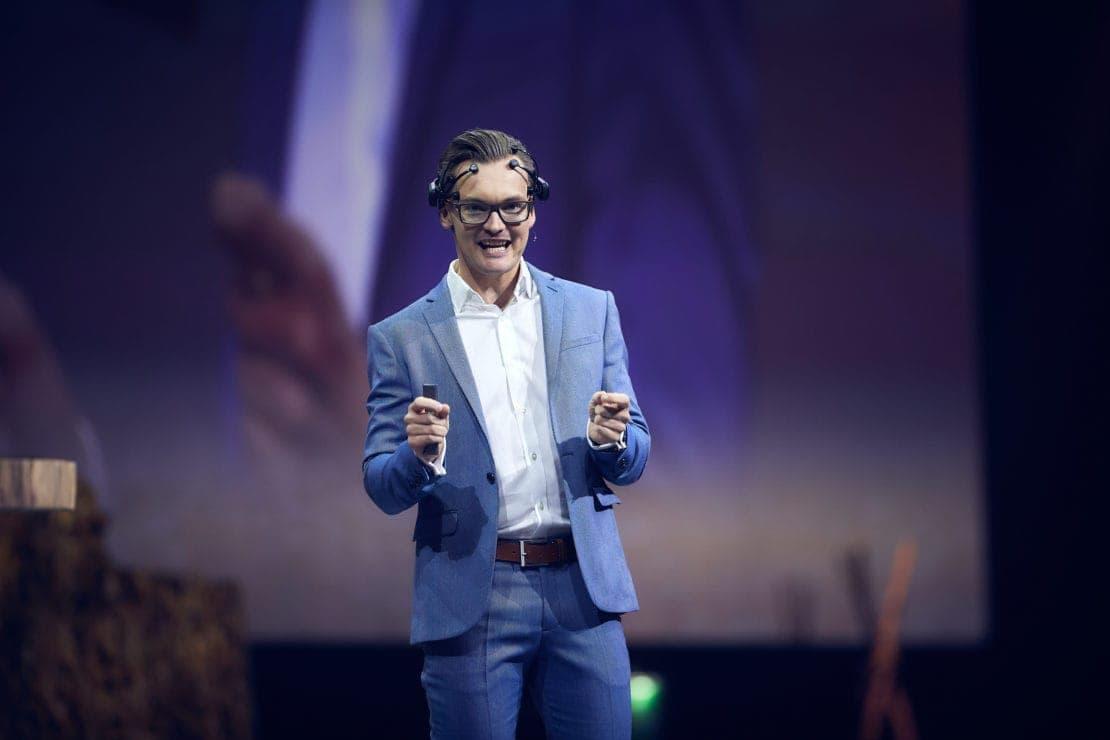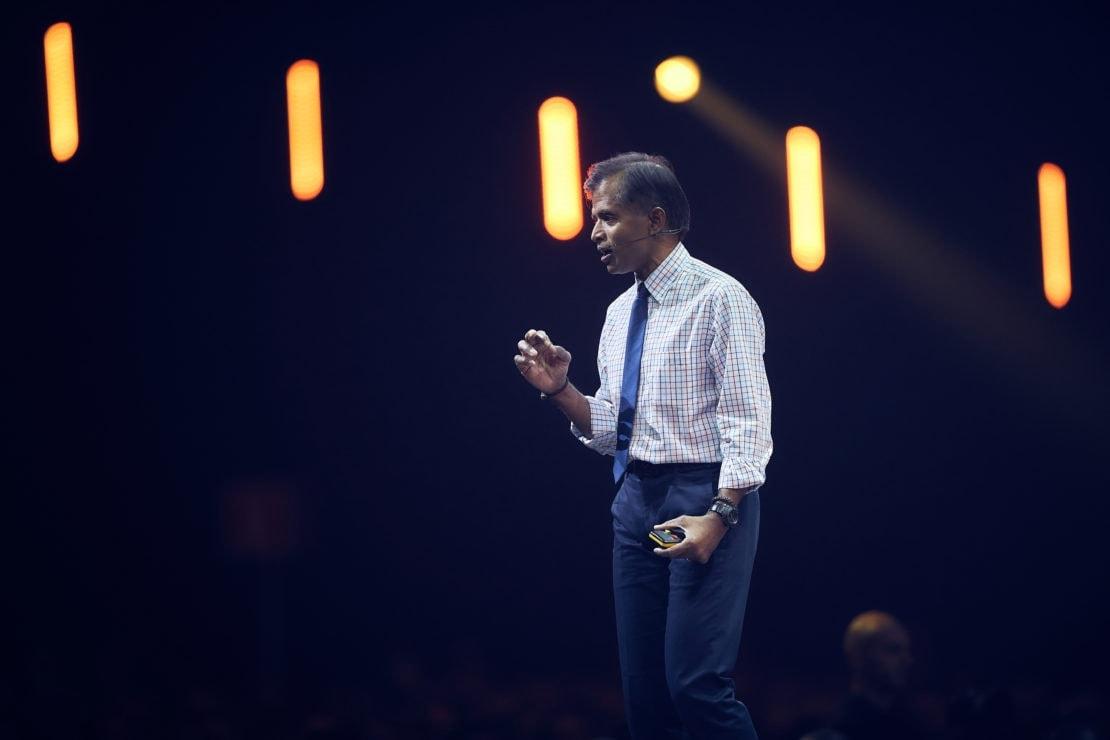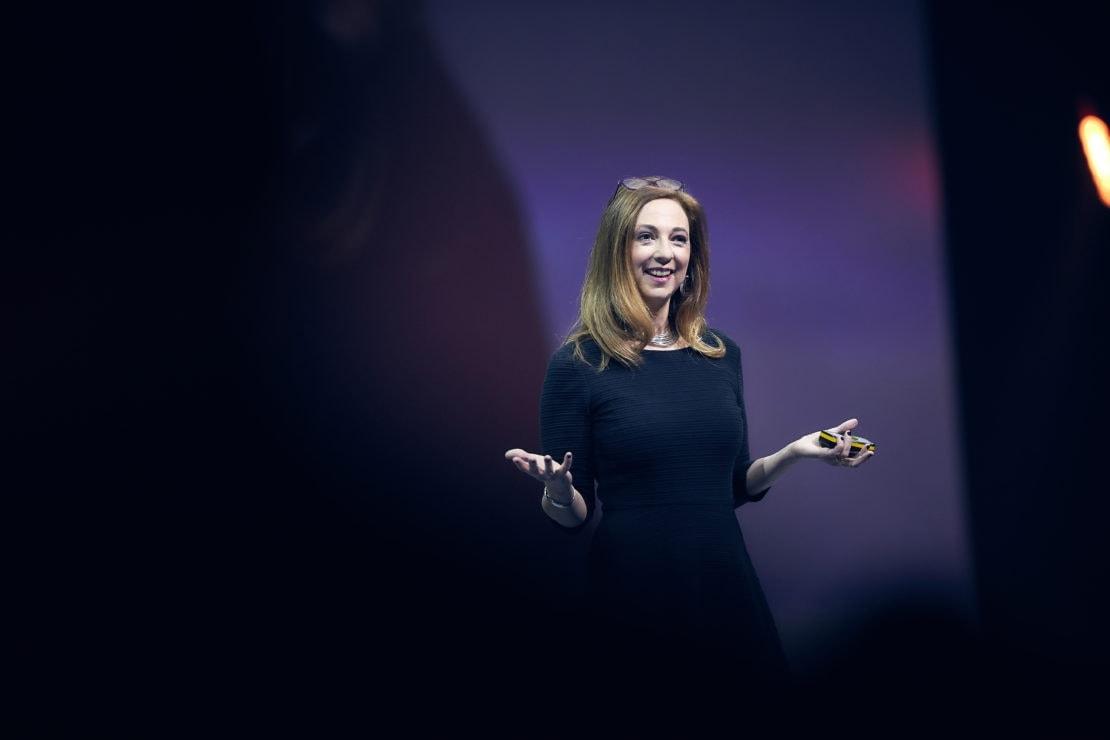19Nov2018
James Hewitt, chief innovation officer at Hintsa Performance, not only reminded the audience at Nordic Business Forum that people can’t always be on – he showed them. Hewitt wore an electroencephalography (EEG) headset during his presentation to monitor his brain activity and visually demonstrate the peaks and troughs in stress and focus levels that he was experiencing. “Even during one of the most demanding events in my speaking career, I couldn’t always be on,” he explained to the audience in Helsinki.
This was just one of the ways in which Hewitt, a performance scientist and researcher, highlighted that peak performance does not arise from trying to imitate a machine but from understanding how to be more effective as a human.
Hewitt pointed out that knowledge workers often try to maximize their output by multitasking, working long hours, and rarely resting. They often struggle and are unable to focus, which results in constant sub-optimal performance. Hewitt also highlighted a quote from Hintsa Performance founder Dr. Aki Hintsa that inspired much of his research: “Optimize. Don’t maximize.”
Knowledge work is an endurance activity
In explaining how the rhythms of work and rest optimize performance, Hewitt recalled his work with Masters road cyclist Claire Jones to prepare for the l’Étape du Tour – an event where amateur cyclists are given the opportunity to ride the Tour de France route. In 2017, she set a goal of finishing in the top 20. Jones and Hewitt devised a plan that would help her be at her best for the final climb, giving her the best possible chance to pass her competition. However, after finishing 54th, an analysis of her performance by Hewitt showed that she increased her intensity earlier than planned instead of saving energy for the climb. “She focused her effort in the wrong place at the wrong time,” said Hewitt. “She didn’t rest where she was supposed to and she followed someone else’s rhythm instead of her own.”
In 2018, Jones returned to the l’Étape du Tour with a very clear understanding of where to focus her efforts and when to rest. She paid attention to when she was at her best. She finished 16th overall and third in her age group, her best ever result in the L’Etape.
Hewitt drew comparisons between optimizing physical performance and cognitive performance after he realized many of his amateur athlete clients were knowledge workers by profession. “I started to use the tools and framework from sports science to understand knowledge work better,” he said. Similar to
low, medium, and high-intensity zones recognized in endurance sports, Hewitt described three gears that can help knowledge workers create a plan to optimize their cognitive performance:
- High Cognitive Gear for focus on complex tasks, analysis, and productivity
- Low Cognitive Gear for rest, recovery and reflection
- Middle Cognitive Gear for menial tasks, switching work, and freeing up
focus for High Gear
Find your rhythm
Hewitt also explained that cognitive rhythms are not the same for all people. About 20% of people are “early birds” whose cognitive peak is in the morning. This peak is followed by a valley best suited for rest and recovery, with a rebound occurring later in the day when the Middle Cognitive Gear is most appropriate. Conversely, “night owls” begin their day with a rebound, followed by a valley, and then a peak at the end of the day. About 60% of the population falls somewhere in between.
Hewitt continued to stress the fact that most knowledge workers spend their days stuck in the Middle Cognitive Gear: stressed, switching tasks, pulling their smartphones out at every opportunity, trying to work on someone else’s schedule. Research shows knowledge workers are interrupted once every 11 minutes on average, with the majority checking smartphones or other communication tools every 6 minutes. “This makes it harder to switch into high gear and low gear when we really need to,” he said.
Match work to the right gear
He challenged knowledge workers to identify when they experience their High, Middle, and Low Cognitive Gears and to structure their day according to their personal rhythms of work and rest. Instead of allowing frequent interruptions during peak times, Hewitt suggested trying to focus for 25 minutes and then taking a short 5-minute break. He continued by calling on business leaders to engineer environments for teams that minimize distraction and interruption.
The Low Cognitive Gear is best suited for breaks that are active, social, and natural, like taking a walk with a friend. He stressed the importance of 7 to 9 hours of sleep per night and team schedules that permit it. After 18 hours of being awake, cognitive performance is equivalent to that of being legally intoxicated in most European countries, and inadequate sleep may be costing the Nordic economy €18 billion Euros per year.
In one study, Hewitt recruited 100 knowledge workers for 14 days and monitored their daily rhythms of sleep, stress, and cognitive performance. He concluded that people who follow regular work and rest patterns feel and perform better, exhibiting 10-15% better cognitive performance. “If they’re too stressed and sleep deprived, it’s not likely that they’re performing sustainably,” Hewitt commented. “Sleep is one of the most effective performance enhancers available.”
Hewitt also advised setting boundaries when switching tasks in the Middle Cognitive Gear, thus minimizing interruptions for maximum productivity. He also stressed the importance of scheduling routine tasks during the “rebound” time in your schedule. “Starting the day with email is starting the day on someone else’s schedule,” he said. Work-related stress is estimated to cost the European
economy €136 billion every year and could be responsible for a much as one-fifth of all cases of staff turnover.
Human cognitive performance is increasingly becoming a differentiator in the workplace. “Complex problem solving, collaboration, and creativity,” said Hewitt, “are the output of a rested and focused brain. These capabilities, however, will not be expressed at their best with our current ways of living and working.” Hewitt said wellbeing, which can improve employee productivity by up to 19%, is set to become a business value of strategic importance.
“Perhaps the real danger isn’t that machines and artificial intelligence are going to start working more like humans,” he concluded. “It’s that we humans will keep trying to work like machines. We can’t always be on.”
About Nordic Business Forum 2018
Nordic Business Forum 2018 was held on 26-27 September in Helsinki, Finland, gathering together 7,500 CEOs, top executives, and entrepreneurs from over 40 countries.
Download the full Executive Summary and read what the speakers said on stage at Nordic Business Forum 2018.


